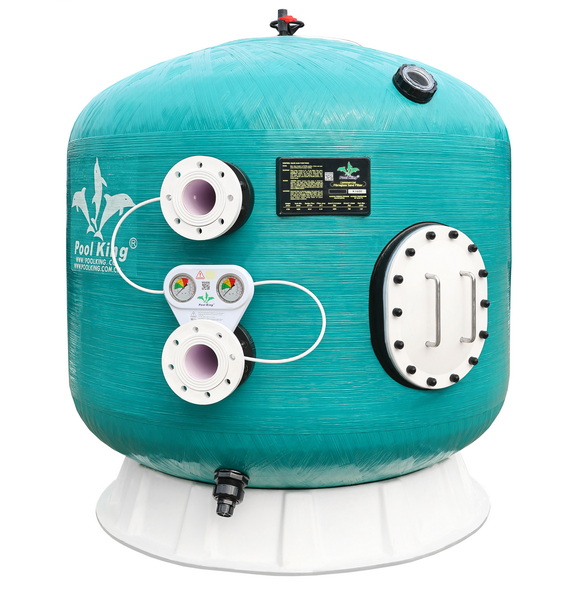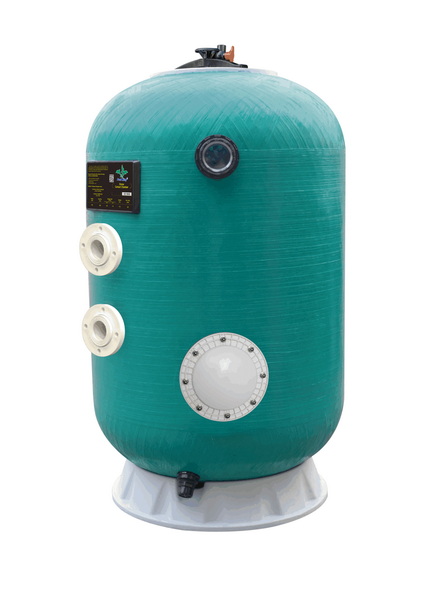Views: 222 Author: Tina Publish Time: 2025-10-10 Origin: Site








Content Menu
>> About Us
● Understanding Pool Filters and Their Lifespans
>> 3. Diatomaceous Earth (DE) Filters
● How to Extend the Life of Your Pool Filter
>> 3. Pressure Gauge Monitoring
>> 4. Maintain Balanced Pool Chemistry
>> 5. Inspect and Replace Worn Parts
>> 6. Winterize Your Pool Filters
● Common Problems That Shorten Pool Filter Life
● Signs It's Time to Replace Your Pool Filter
● Frequently Asked Questions (FAQs)
>> 1. How often should I replace the sand in my filter?
>> 2. Can cartridge filters be cleaned or just replaced?
>> 3. How long should I run my pool filter each day?
>> 4. What happens if I don't replace my pool filter on time?
>> 5. Is it better to choose sand, cartridge, or DE filters?
Maintaining a clean and efficient swimming pool depends greatly on the performance of your pool filter. This article will explore the expected lifespan of various pool filter types, how to extend their longevity, common signs for replacement, and maintenance tips. We'll also provide answers to frequently asked questions to help you keep your pool crystal clear.
We are a professional Chinese manufacturer specializing in top-tier sand filters and filtration solutions. Utilizing intelligent machinery, we produce high-quality products including pool filters (sand filters, diatomaceous earth (DE) filters, cartridge filters), water pumps, LED lights, and accessories. We offer OEM services to international brand owners, wholesalers, and manufacturers.

Pool filters are essential in removing debris and contaminants from pool water, ensuring safety and clarity. There are three main types of pool filters commonly used:
Sand filters use pool-grade sand as the filtering medium. Water is pushed through the sand, which traps debris and particles.
- Typical lifespan: The sand media lasts about 7 to 10 years with proper maintenance. The filter tank itself can last over 10 years if well cared for.
- How it works: Water enters the top of the filter tank and flows downward through the sand bed. The sand traps dirt particles and impurities as water flows through.
- Maintenance: Backwashing the sand filter regularly reverses water flow to flush out trapped debris, which is crucial to prevent clogging.
These filters use pleated cylindrical cartridges made of polyester or similar materials to catch dirt and debris.
- Typical lifespan: Cartridge filter elements usually last 2 to 3 years, with the whole cartridge lifespan ranging from 3 to 5 years depending on maintenance and usage frequency.
- How it works: Pool water passes through the pleated cartridge, filtering out particles. Cartridges can capture finer particles than sand filters.
- Maintenance: Cartridges should be sprayed clean with a hose regularly and soaked periodically in specialized cleaning solutions.
DE filters use fossilized plankton powder coating a grid to catch tiny particles down to a few microns.
- Typical lifespan: The DE powder can be replaced frequently (often with every backwash), while the filter body or grids last 5 to 7 years or more.
- How it works: Water passes through the DE-coated grids, trapping extremely fine particles, making this the most effective type of filter.
- Maintenance: Requires regular backwashing and replenishing of DE powder after each cleaning cycle.
Several variables influence how long your pool filter will last:
- Usage Frequency and Pool Size: Larger pools or frequent swimming require more filtration, which may shorten filter lifespan due to increased strain.
- Water Chemistry: Incorrect water balance (pH, alkalinity, sanitizer levels) can accelerate filter wear or clogging due to algae and scale buildup.
- Maintenance Practices: Cleaning frequency, backwashing, and inspection directly impact filter longevity.
- Filter Model and Brand Quality: Higher-grade filters generally have longer lifespans and withstand harsh swimming conditions better.
- Environmental Conditions: Pools in dusty or leafy environments may clog filters faster.

Effective cleaning prevents buildup that damages the filter and reduces efficiency over time.
- For sand filters, perform a full backwash procedure when the pressure gauge rises 8-10 PSI above normal. Change the sand every 7-10 years.
- For cartridge filters, hose off debris weekly, soak in filter cleaning solutions monthly, and replace cartridges every 2-3 years or when visibly worn.
- For DE filters, backwash frequently and add fresh DE powder after each cleaning cycle.
- Run your pool filter 8 to 12 hours daily, depending on pool size and usage, ideally in multiple shifts to optimize water circulation.
- Avoid running the filter pump dry or for prolonged periods without cleaning, which can cause component wear.
Pressure increases in the filter tank indicate clogging and the need for cleaning. Monitor your filter's gauge regularly; a rise above 8-10 PSI from the baseline typically means it's time to clean.
Unsuitable pH (7.2-7.8) and sanitizer levels (chlorine 1-3 ppm) contribute to scale and organic buildup on filters, reducing lifespan. Regular testing and adjustment are essential.
Inspect cartridges for tears or damage; damaged cartridges reduce filtration and can introduce debris back into the pool. Similarly, inspect sand for hardening and clumping; replace as necessary.
In cold climates, properly drain and store cartridge and DE filters to prevent freeze damage. Sand filters may require winter treatments to prevent sediment compaction.
- Clogging with debris or algae: Leads to pressure buildup and inefficient filtration.
- Improper backwashing or cleaning: Causes sand channeling or cartridge fouling.
- Chemical imbalances: Result in corrosion or scale formation on filter components.
- Running the pump when water levels are low: Can damage the pump and filter seals.
- Ignoring pressure gauges or filter condition: Leads to premature failure.
- Persistently cloudy or dirty pool water despite cleaning efforts.
- Constantly rising and high pressure readings on the filter gauge.
- Noticeable reduction in water flow or pump inefficiency.
- Visible damage such as cracked filter tanks, torn cartridges, or hardened sand.
- Manufacturer's recommended service or replacement period has been exceeded.
A properly maintained pool filter is critical for ensuring clean, safe swimming water. The lifespan of a pool filter depends on its type, usage, water chemistry, and maintenance. Sand filters generally last 7-10 years in terms of sand replacement, cartridge filters last 2-3 years before replacement, and DE filters require frequent media maintenance but offer superior filtration.
To maximize your filter's longevity, maintain balanced water chemistry, clean and backwash your filter regularly, monitor pressure gauges, and replace worn components promptly.
Choosing the right filter depends on your pool size, maintenance preference, and desired water clarity. Always follow manufacturer recommendations and seek professional advice if unsure.
For high-quality pool filtration solutions—including sand filters, cartridge filters, DE filters, water pumps, LED lights, and accessories—we provide reliable OEM manufacturing services tailored for overseas brands, wholesalers, and manufacturers. Contact us to learn how we can meet your pool filtration needs with smart production technology.

Typically, pool sand should be replaced every 7 to 10 years to maintain proper filtration performance. Worn sand becomes rounded and less effective at trapping debris.
Cartridge filters can be cleaned multiple times by hosing off dirt and soaking in filter cleaning solutions. However, replace cartridges every 2 to 3 years or earlier if damaged.
Most pool experts recommend running your filter 8 to 12 hours daily. The exact duration depends on pool size, pump capacity, and usage.
Delaying replacement causes poor water quality, increased pump strain, inefficient filtration, and potential costly damage to pool equipment.
It depends on your preferences and pool needs:
| Filter Type | Advantages | Disadvantages |
|---|---|---|
| Sand Filter | Low maintenance, long lifespan | Larger tank size, less fine filtration |
| Cartridge Filter | Efficient filtration, compact | Requires frequent cleaning and replacement |
| DE Filter | Finest filtration, crystal clear water | Higher maintenance, costlier |
